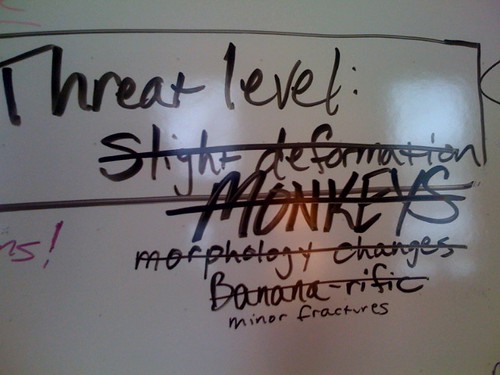More reading for my thesis lit review has uncovered a story that would fit nicely into Alan Levine’s growing collection of Amazing Stories of Openness; “personal stories that would not have been previously possible, enabled by open licensed materials and personal networks.”
This one involves Twitter, and comes from a research paper called How and why people Twitter: the role that micro-blogging plays in informal communication at work.
The open subscription feature in Twitter not only allows users to find interesting people to follow for exchange of information and thoughts, but may also help to establish valuable personal relationships for future collaborations. Tom told us an amazing story about such an experience. A while ago, he tweeted about a book that he was reading and liked a lot. Natasha, a social constructer, was reading the book at the similar period of time. She found Tom’s tweets about the book very interesting and they started following each other on Twitter. Natasha worked on a project with the Kenyan government working to pull Kenya people out of poverty through ICT. Several months later, Natasha sent Tom a message on Twitter asking whether she could talk with him to learn more about Tom’s company before her meeting with executives of the company about the Kenya project. After the meeting with Tom, Natasha invited him to the executive briefing and also invited him as a representative from the company working on the Kenya project. In Tom’s words:
“So, that’s the type of relationship that can be built simply through Twitter. I never knew Natasha, and haven’t been knowing anything about Kenya. She finds me because our common interests and developed a positive relationship that I am very proud of and very interested in continuing.”
Later in the paper, the researchers elaborate more on this relationship.
In the story that we have described previously about Natasha inviting Tom into her Kenya project, Tom told us that this collaboration opportunity not only came through a personal relationship built between him and Natasha, but also because she was able to get to know him from his Twitter updates.
“One of the things that I said to [Natasha] is that I am not an executive and I don’t have any related to executive pool. She said, yeah, I know, I have been watching you for 4 or 5 months now, I understand who you are and I understand your position, but I still want you to be part of this conversation because I know you understand [the technology]. She didn’t care whether or not I had any executive poll, she knew from following me on Twitter, what I was interested in and she knew how I could help her.
Would this type of opportunity come about for Tom BT (Before Twitter)? Perhaps, if Tom and Natasha were in fairly close proximity to each other, and had the opportunity to interact on a fairly regular basis in such a way that Tom could showcase his expertise in an area that Natasha was interested in. But the fact that Natasha was able to follow Tom’s work for such a long period of time, and observe, in such an unobtrusive, ambient way, the level of Tom’s abilities and understanding on a topic Natasha was interested in says to me that there is a different form of relationship building happening here. And, more importantly, a different measure of how we determine who the “experts” are who can provide us what we need when we need it.
Zhao, D., & Rosson, M. B. (2009). How and why people Twitter: the role that micro-blogging plays in informal communication at work. In Proceedings of the ACM 2009 international conference on Supporting group work (pp. 243-252). Sanibel Island, Florida, USA: ACM. doi:10.1145/1531674.1531710
